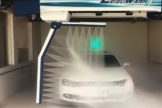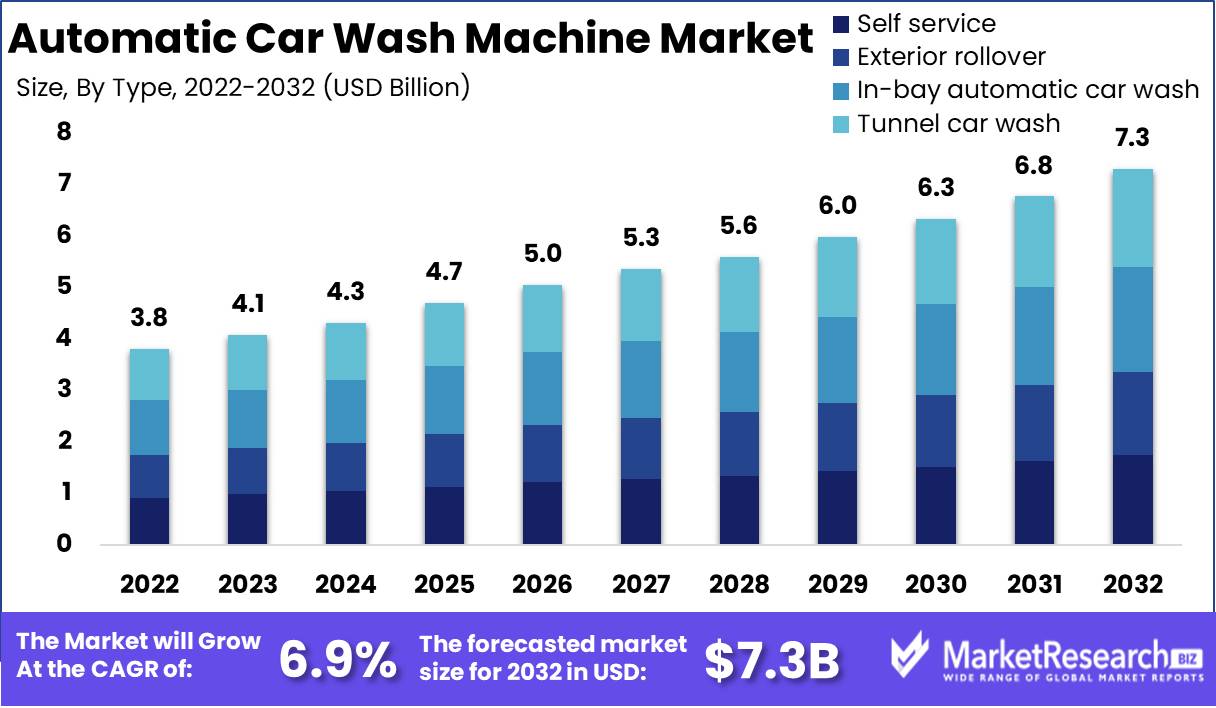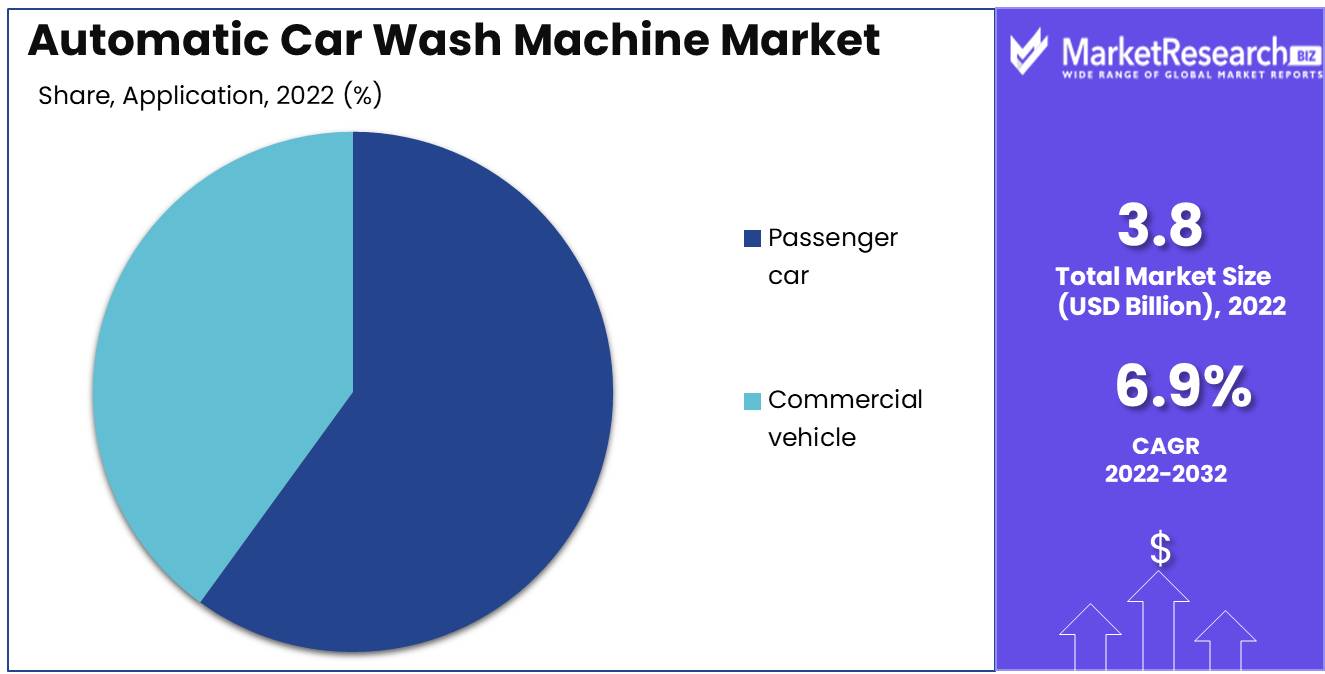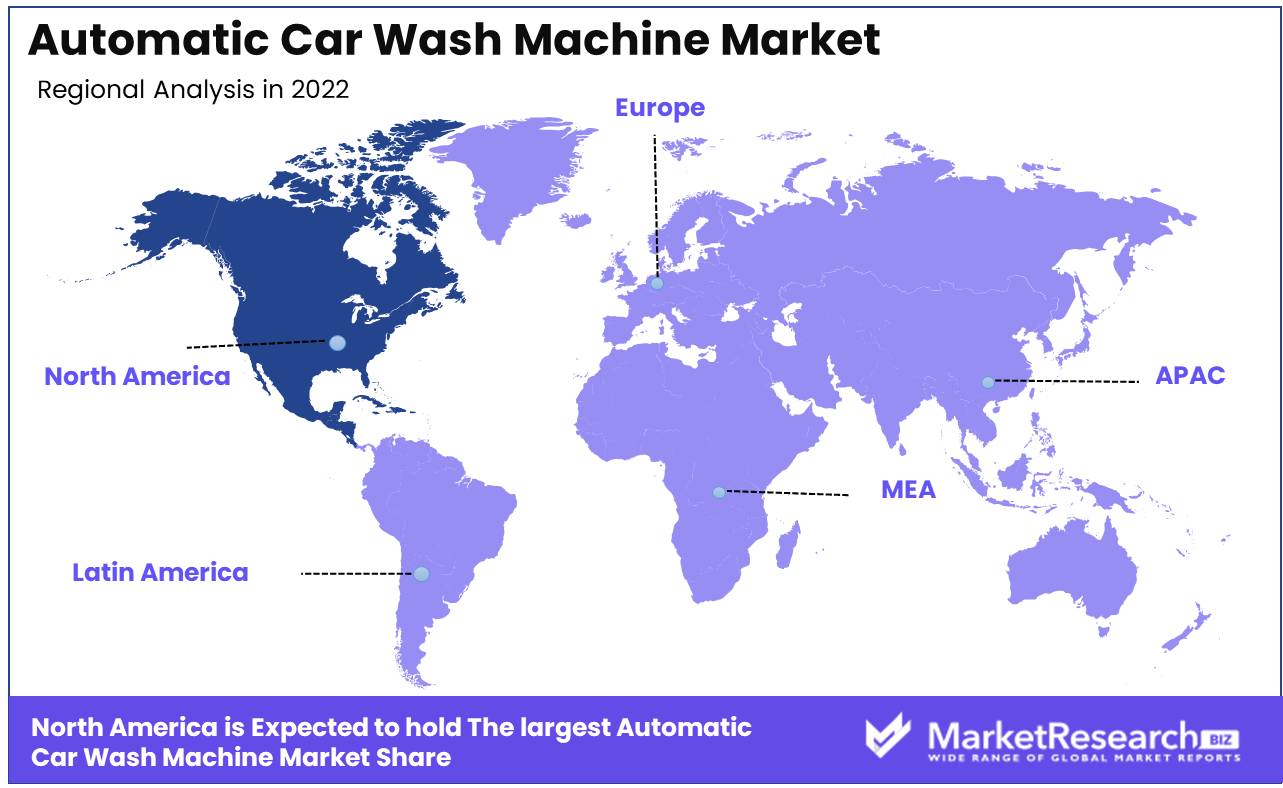
Automatic Car Wash Machine Market by Type (Self service, Exterior rollover, In-bay automatic car wash, Tunnel car wash), by Component (Drives, Motors, Foamer Systems, Dryers, Pumps, Others), by Application (Passenger car, Commercial vehicle) By Region And Companies - Industry Segment Outlook, Market Assessment, Competition Scenario, Trends, And Forecast 2023-2032
-
10729
-
May 2023
-
186
-
-
This report was compiled by Correspondence Linkedin | Detailed Market research Methodology Our methodology involves a mix of primary research, including interviews with leading mental health experts, and secondary research from reputable medical journals and databases. View Detailed Methodology Page
-
Report Overview
Automatic Car Wash Machine Market size is expected to be worth around USD 7.4 Billion by 2032 from USD 3.8 Billion in 2022, growing at a CAGR of 6.9% during the forecast period from 2022 to 2032.
Automatic Car Wash Machine Market, a marvelous device that automates the arduous task of cleaning vehicles by utilizing the power of water and detergents. This remarkable innovation has provided car owners with uncomplicated maintenance by revolutionizing the car-washing industry. Behold, my beloved reader, for automatic car wash machines come in a variety of shapes and sizes, from portable companions that serve individual car owners to colossal wash tunnels that accommodate even the largest commercial behemoths.At the core of every automatic car wash machine market pulses a single mission: to clean with unrivaled efficacy, speed, and precision while preserving the exterior's pristine integrity. From washing and rinsing to drying and polishing, these technological marvels are designed to perform an extensive array of cleaning duties. The synergistic orchestration of high-pressure water jets, rotating brushes, and a collection of mechanical components dances harmoniously to remove filth and grime from the car's surface, leaving nothing but gleaming splendor in its place.

Automatic car wash devices' unrivaled effectiveness and efficiency have cemented their position as a cornerstone in the car wash industry. Their numerous benefits easily outweigh the conventional practices of the past. Imagine the liberation of time and the prudent use of resources that would result. In a matter of minutes, your cherished vehicle can be baptized, rinsed, and given a delicate caress of drying, all without the arduous effort of manual labor. This soaring trajectory is a result of the unquenchable demand for car washing services, the rising tide of environmental awareness, and the search for cost-effective and effective cleaning solutions that consistently meet our requirements.The transformative influence of automatic car wash machine technology has transcended its humble beginnings, permeating numerous industries. Diverse industries, including automotive, hospitality, and retail, have fallen under its influence. Car dealerships, ever the purveyors of automotive fantasies, along with car rental agencies, hotels, and shopping malls, have woven the enchanting threads of automatic car wash machines into the very fabric of their establishments, bestowing effortless and harmonious car washing experiences upon their cherished customers.
However, dear reader, let us not dismiss the ethical dilemmas that lurk in the shadows; let us examine the use of automatic car wash machines with a critical eye. Our consciousness is haunted by the specter of potential environmental repercussions, exemplified by the prodigious consumption of water and the specter of chemical discharge. To calm the stormy gusts of concern, a new generation of environmentally friendly automatic car wash machines has emerged. Armed with eco-friendly detergents and innovative water recycling techniques, they endeavor to satisfy our collective desire for a sustainable future.
Driving factors
Manufacturers invest heavily to improve component performance
The most recent research report on the Automatic Car Wash Machine Market identifies a variety of growth-driving factors. The substantial investments made by manufacturers to improve component performance is one such factor. This has resulted in the creation of efficient and effective car wash machines that provide superior results in less time. In addition, manufacturers are emphasizing on innovative solutions for cost reduction and increased profitability, resulting in the creation of more affordable and high-performing car wash machines. The cost-effective Tandem Surfline Vehicle Wash System from PDQ Manufacturing features multiple wash options and enhanced performance.
Competitive advantage is provided by automated technology and multi-vehicle accommodations.
In addition, automated technology and multi-vehicle accommodations provide businesses with a competitive advantage. Consumers prefer cutting-edge technologies for improved car wash experiences, and the demand for automatic car wash machines is rising as customer expectations for efficient and time-saving car wash processes rise. In addition to a strong emphasis on product deliverability, performance, and dependability, manufacturers are developing more efficient and dependable car wash machines. The increasing prevalence of automated jet sprays, regulators, and automation demonstrates this market's enormous potential.
Technological advances permit cost-effective car wash solutions.
In addition, technological advancements make affordable car wash solutions possible. However, there may be current or potential changes in regulations that could impact the Automatic Car Wash Machine Market, and manufacturers must stay abreast of these changes to remain competitive. Emerging technologies may also have a significant impact on the Automatic Car Wash Machine Market, and businesses must be aware of them to capitalize on the opportunities they present.
Restraining Factors
High Initial Expenses
The high initial costs of automatic car wash devices are one of their primary limitations. The purchase and installation of an automatic car wash machine can be quite costly, particularly for small business proprietors. Additionally, the machine's maintenance and repair expenses contribute to the initial investment. However, the expense can be mitigated by the automatic car wash equipment's ability to increase business revenue by attracting more customers.
Limited access to water
Water is an indispensable resource for automatic car washing machines. The dearth of water supply can restrict the machine's functionality. The business may be negatively impacted by regions with limited water resources or water restrictions. In certain instances, it may be necessary to invest in a water recycling system, which can increase initial expenses.
Environmental Regulations
Environmental regulations are an additional constraint on automatic car wash devices. Numerous nations have enacted stringent environmental regulations to protect the environment from hazardous substances. The use of harsh chemicals and detergents in vehicle wash machines can have a negative impact on the environment and result in hefty fines if regulations are not followed. In their operations, business proprietors must consider these regulations and invest in eco-friendly products.
Consumer Preference Difficulties
Even though automatic car wash machines are more convenient than traditional car washing methods, not all consumers favor them. Some motorists prefer hand-washing their vehicles, while others prefer full-service car washes. In addition, the belief that automatic car washes are not as thorough as manual washing methods causes some clients to be skeptical of the service. To surmount this obstacle, owners of automatic car washes should promote the benefits of automatic car washes and provide superior customer service to make customers feel more at ease.
Covid-19 Impact on Automatic Car Wash Machines Market
The COVID-19 pandemic has reduced car wash traffic. The global lockdown has reduced travel and vehicle use. Customers have dropped due to non-essential businesses closing, including car washes. Thus, many car wash owners have had to close.Many Automatic Car Wash Machine Market manufacturers are having trouble getting parts and equipment due to supply chain interruptions. The epidemic has delayed equipment and part shipping, delaying automatic car wash machine installation and maintenance.
The pandemic has raised awareness of hygiene and cleanliness. To protect customers and employees, car wash providers must follow stricter hygiene regulations. Most car washes require masks, gloves, sanitization, and social distance. Car wash operators' costs have increased, hurting profitability and sustainability.The COVID-19 outbreak has made customers wary of car washes. Mandatory rules have increased client wait times, causing congestion and unsatisfied customers. Thus, many car wash operators are using new technology like contactless card payment and booking systems to cut wait times and increase efficiency.The COVID-19 pandemic has hit the Automatic Car Wash Machines industry hard, but owners are finding creative ways to keep their businesses running. Car wash owners are installing contactless payment systems, self-service kiosks, and remote monitoring. These strategies assist car wash businesses maintain social distance, increase efficiency, and cut costs.
By Type Analysis
Automatic car wash machines make it easy to clean and maintain cars without any work. The in-bay car wash segment dominates the market for automatic car wash machines. The in-bay car wash segment employs an enclosed bay or tunnel. The bay washes, rinses, and dries the car automatically. Convenience and cleaning power make this category more popular.Emerging economies' economic growth drives the in-bay car wash segment. Disposable incomes are raising vehicle maintenance and appearance awareness. They prefer automatic car wash machines, especially the in-bay method available in many petrol stations and convenience stores. Tourism in developing countries has increased car wash machine demand. The fast-growing car rental industry in these countries is also driving car wash equipment use.
Globally, automatic car wash machine usage is evolving. People are becoming more environmentally conscious and wish to help. They prefer eco-friendly vehicle wash devices that use less water and electricity. In-bay vehicle wash machines use less water and biodegradable products, making them better for the environment. Automatic vehicle wash machines clean better than manual ones, which pleases customers.The in-bay car wash segment saves time and effort for busy customers. Gas stations offer car washes while customers fill up or eat. It eliminates long car wash lines.The in-bay car wash segment of automatic car wash machines is predicted to develop the fastest. Due the need for quick, easy, and effective car cleaning options. Shopping malls, sports centers, amusement parks, and parking lots with in-bay vehicle wash equipment are also growing this industry. Technology and automation have made in-bay car wash machines more appealing to clients by improving services, cleaning quality, and cost.
By Component Analysis
The pumps segment dominates the automatic car wash machine market. These machines' pumps supply enormous volume and pressure, making them the most important component for car washing.Emerging economies drive pumps' growth. Auto wash equipment are in demand due to rising disposable incomes and automotive maintenance spending. Consumers choose machines with better pumps for better cleaning.Pumps consumers value performance and dependability. Quality pumps give investors the finest results. Pumps that use less energy and water without affecting the cleaning process have been developed as a result of consumers' interest in energy-efficient and eco-friendly technologies. This has made pumps more appealing, especially for eco-friendly and cost-effective cleaning.
Several variables will drive the fastest growth in automatic car wash pumps in the next years. High-quality cleaning solutions have driven the development of smarter, more efficient pumps. Variable frequency drives help pumps run more efficiently, lowering costs and extending lifespans. More competition in the pumps industry has led to improved products.
By Application Analysis
The passenger cars segment dominates the automatic car wash machine market. For passenger cars, which need frequent washing and upkeep to stay in good condition, automatic car wash machines are popular.Emerging economies drive passenger cars. As disposable incomes improve, more individuals can purchase cars, increasing car wash machine demand. In emerging markets, passenger car rental has expanded, increasing car wash machine demand.
Regular vehicle cleaning is becoming more important to consumers. Most people own or drive passenger cars, making them more popular. Eco-friendly, cost-effective devices attract consumers.Several factors will drive the fastest growth in automatic car wash equipment for passenger cars. The car wash machine industry is growing as more emerging economies can afford cars and cleaning solutions. Automatic car wash equipment in these countries save time and money due to the tourism and automobile rental businesses. The category of passenger cars is expected to rise due to the tendency of complicated designs and car ownership in metropolitan regions.

Key Market Segments
by Type:
- Self service
- Exterior rollover
- In-bay automatic car wash
- Tunnel car wash
by Component:
- Drives
- Motors
- Foamer Systems
- Dryers
- Pumps
- Others
by Application:
- Passenger car
- Commercial vehicle
Growth Opportunity
Escalating demand for premium car washes
The increased discretionary income of the middle class has increased the demand for premium car wash services. People are willing to pay an additional dollar for superior service, and this has prompted car wash centers to innovate their offerings. With sophisticated wash techniques, waxing, and polishing, automatic car wash machines have advanced greatly in recent years. The industry of automatic car washes has developed exponentially by providing premium services at affordable prices.
Mobile car wash services are introduced.
The modern population is busier than ever before, and time is of the essence. This trend has prompted the development of mobile car wash services. Customers can now request a car wash service without leaving their homes. Companies that offer automatic car washes have embraced technology, and this trend is gaining popularity daily. Those who wish to start a car wash business without requiring a tangible location can now do so thanks to this opportunity.
Superior cleansing procedures
High-end cleaning techniques are one of the reasons why automatic car wash machines are becoming increasingly popular. In contrast to manual car washing, automatic car wash machines employ advanced washing systems, such as high-pressure water jets and soft-cloth-covered brushes. These methods guarantee that the car is thoroughly cleaned without causing any injury to its paint. The automatic car wash industry has integrated technology into its cleansing procedures, allowing it to consistently provide high-quality services.
Latest Trends
The Automatic Car Wash Machine Market is Being Shaped by Major Market Trends
With the adoption of new technologies and altering consumer preferences, the Automatic Car Wash Market has undergone a significant transformation in recent years. Eco-friendly cleaning products, the incorporation of artificial intelligence and machine learning, the adoption of contactless payment methods, personalized customer experiences, and water conservation initiatives have emerged as key market trends influencing the automatic car wash machine industry. In this Automatic Car Wash Machine Market Report, we will examine the impact of these trends on the industry.
Environmentally Friendly Cleaning Products
Due to rising environmental concerns, the demand for eco-friendly cleaning products in car wash enterprises has increased. Not only do eco-friendly cleaning products reduce their environmental impact, but they also produce superior cleaning results compared to conventional cleaning products. Additionally, the use of eco-friendly cleansing products assists car wash companies in meeting regulatory requirements and enhancing their brand image. Customers are increasingly concerned about the environment and are prepared to pay a premium for eco-friendly car wash services.
Integration of AI and Deep Learning
The incorporation of AI and machine learning into car wash systems has significantly increased the industry's level of automation. AI is capable of analyzing consumer data and providing personalized suggestions that improve the customer experience. By analyzing car wash data and optimizing resource utilization, machine learning algorithms can enhance the efficacy of car wash processes. AI and machine learning also contribute to the predictive maintenance of car wash equipment, thereby reducing downtime and enhancing operational efficiency.
Individualized Customer Interactions
It is impossible to overstate the significance of providing personalized client experiences. Customers anticipate that car wash businesses will comprehend their needs and provide services that meet their requirements. Advanced technologies such as artificial intelligence and machine learning can analyze consumer data and provide suggestions for a more personalized experience. Personalization of the customer experience results in repeat commerce, positive reviews, and customer loyalty.
Regional Analysis
North America has one of the highest rates of vehicle ownership in the globe. The majority of households own at least one car, and this number continues to rise annually. This trend has resulted in an increase in the demand for automatic car wash services, as car owners seek more convenient means of keeping their vehicles clean.The hectic tempo of modern life has made it increasingly difficult for car owners to devote the time and effort required for manual car washing. Car owners can save time and effort by using automatic car wash services, which offer a fast and efficient solution.Numerous regions of North America experience severe weather, particularly during the winter season. This weather is not conducive to manual car washing, so car owners must use automatic car wash services to keep their vehicles clean during these difficult times.
Numerous North Americans are environmentally conscious and eager to avoid actions that affect the environment. Automatic car wash services utilize water- and energy-efficient systems that are favorable to the environment, making them a popular option for those who are environmentally conscious.As part of their after-sale services, many car dealerships in North America now offer automatic car washing. In order to maintain the warranty and resale value of their vehicles, an increasing number of car owners are opting for automatic car wash services, which has increased their popularity.

Key Regions and Countries
North America
- US
- Canada
- Mexico
Western Europe
- Germany
- France
- The UK
- Spain
- Italy
- Portugal
- Ireland
- Austria
- Switzerland
- Benelux
- Nordic
- Rest of Western Europe
Eastern Europe
- Russia
- Poland
- The Czech Republic
- Greece
- Rest of Eastern Europe
APAC
- China
- Japan
- South Korea
- India
- Australia & New Zealand
- Indonesia
- Malaysia
- Philippines
- Singapore
- Thailand
- Vietnam
- Rest of APAC
Latin America
- Brazil
- Colombia
- Chile
- Argentina
- Costa Rica
- Rest of Latin America
Middle East & Africa
- Algeria
- Egypt
- Israel
- Kuwait
- Nigeria
- Saudi Arabia
- South Africa
- Turkey
- United Arab Emirates
- Rest of MEA
Market Share & Key Players Analysis
Due to the convenience they offer, the automatic car wash machines market has grown in popularity in recent years. Numerous key participants in the automatic car wash industry are at the forefront of providing innovative and effective car wash solutions.WashTec is one of the main players in the industry. WashTec is a global leader in car wash systems and offers a variety of automatic car wash machines to accommodate a variety of budgets and requirements. Their user-friendly and efficient systems guarantee that consumers always receive a thorough and effective wash.
Istobal is another major participant in the industry. Istobal is a Spanish company that provides a variety of car wash solutions, such as automatic car wash machines. Their machines are designed to conserve energy, thereby reducing the operational expenses of car wash businesses. Their selection of automatic car wash machines includes both touchless and brush-based washing options.Additionally, Sonny's Enterprises is a significant player in the automatic car wash machine market. They are a company situated in the United States that provides a range of car wash solutions, including automatic car wash machines. Their machines are renowned for their durability and longevity, making them an attractive option for car wash enterprises.
Top Key Players in Automatic Car Wash Machines Market
- WashTec AG
- Istobal S.A.
- Autec, Inc.
- Coleman Hanna Car Wash Systems
- CAROLINA PRIDE CAR WASH SYSTEMS AND SOLUTIONS
- Washworld Inc.
- PECO Car Wash Systems
- Washworld Inc.
- National Carwash Solutions
- Car Wash Systems, Inc.
- PDQ Vehicle Wash Systems
Recent Development
PDQ Manufacturing introduced touchless car wash systems in 2021, a welcome development. These systems use sophisticated sensor technology and high-pressure water to wash cars without requiring physical contact, resulting in a safer and more efficient washing experience. The touchless system is especially essential for electric and hybrid vehicle owners.
Istobal pushed the development of hybrid vehicle wash systems in 2022, closely following in the footsteps of PDQ Manufacturing. Combining touchless and friction washing technologies allows operators to tailor their car wash to various vehicle types. This adaptability increases cleansing efficiency and, consequently, client satisfaction.
WashTec AG is one of the most innovative companies; it takes eco-sustainability to the next level by creating advanced water recycling systems designed to reduce water usage. With the sophisticated water filtering systems incorporated into their automatic car wash machines, water that would normally be lost during washing can be recycled, thereby promoting a more eco-friendly approach to car washing.
Report Scope
Report Features Description Market Value (2022) USD 3.8 Bn Forecast Revenue (2032) USD 7.4 Bn CAGR (2023-2032) 6.9% Base Year for Estimation 2022 Historic Period 2016-2022 Forecast Period 2023-2032 Report Coverage Revenue Forecast, Market Dynamics, COVID-19 Impact, Competitive Landscape, Recent Developments Segments Covered by Type (Self service, Exterior rollover, In-bay automatic car wash, Tunnel car wash), by Component (Drives, Motors, Foamer Systems, Dryers, Pumps, Others), by Application (Passenger car, Commercial vehicle) Regional Analysis North America – The US, Canada, & Mexico; Western Europe – Germany, France, The UK, Spain, Italy, Portugal, Ireland, Austria, Switzerland, Benelux, Nordic, & Rest of Western Europe; Eastern Europe – Russia, Poland, The Czech Republic, Greece, & Rest of Eastern Europe; APAC – China, Japan, South Korea, India, Australia & New Zealand, Indonesia, Malaysia, Philippines, Singapore, Thailand, Vietnam, & Rest of APAC; Latin America – Brazil, Colombia, Chile, Argentina, Costa Rica, & Rest of Latin America; Middle East & Africa – Algeria, Egypt, Israel, Kuwait, Nigeria, Saudi Arabia, South Africa, Turkey, United Arab Emirates, & Rest of MEA Competitive Landscape WashTec AG, Istobal S.A., Autec, Inc., Coleman Hanna Car Wash Systems, CAROLINA PRIDE CAR WASH SYSTEMS AND SOLUTIONS, Washworld Inc., PECO Car Wash Systems, Washworld Inc., National Carwash Solutions, Car Wash Systems, Inc., PDQ Vehicle Wash Systems Customization Scope Customization for segments, region/country-level will be provided. Moreover, additional customization can be done based on the requirements. Purchase Options We have three licenses to opt for: Single User License, Multi-User License (Up to 5 Users), Corporate Use License (Unlimited User and Printable PDF) -
-
- WashTec AG
- Istobal S.A.
- Autec, Inc.
- Coleman Hanna Car Wash Systems
- CAROLINA PRIDE CAR WASH SYSTEMS AND SOLUTIONS
- Washworld Inc.
- PECO Car Wash Systems
- Washworld Inc.
- National Carwash Solutions
- Car Wash Systems, Inc.
- PDQ Vehicle Wash Systems




